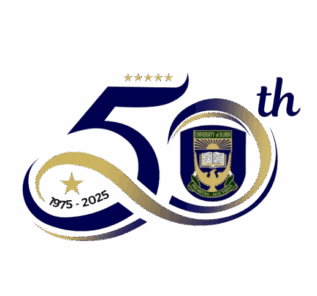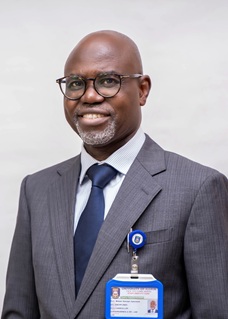By Tajudeen Babamale
The Vice Chancellor of the University of Ilorin, Prof. Wahab Olasupo Egbewole, SAN, has congratulated eight academic staff members of the University that won the 2024 TETFund National Research Fund (NRF) Intervention, describing their achievement as a collective victory for the University.
Prof. Egbewole gave the kudos while presenting the award letters to the beneficiaries penultimate Friday (August 15, 2025) at the Auditorium Basement.
The eight research projects attracted a combined grant of over ₦220 million.
The monetary values of grants won by the Principal Researchers are: Dr Oloyede Muhtahir Oluwaseyi, Department of Information Technology, ₦20,000,000.00; Prof. Animasawun Gbemisola Abdul-Jelil, Centre for Peace and Strategic Studies, ₦33,515,180.00; Dr Odebode Adeola Aminat, Department of Educational Guidance and Counselling, ₦34,272,000.00; Prof. Owalude Samson Owatunji, Department of Chemistry, ₦24,320,000.00; Prof. Fawibe Ademola Emmanuel, Department of Medicine, ₦18,196,800.00; Prof. Arokoyo Bolanle Elizabeth, Department of Linguistics and Nigerian Languages, ₦38,287,654.12; Prof. Aderinoye Abdulwahab Sidiqat, Department of Agricultural Extension and Rural Development, ₦28,000,000.00; and Dr. Kazeem Muinat Olanike, Department of Microbiology, ₦23,947,200.00.
Prof. Egbewole, who is also the Secretary-General of the Association of West African Universities (AWAU), noted that the University must be proud of the efforts of the researchers whose projects brought such recognition and resources to the institution. He pledged that UNILORIN would continue to encourage its research community to put in their best, with the hope of securing more grants in the future.
The Vice Chancellor recalled that he had challenged the Centre for Research, Development and In-House Training (CREDIT) last year to ensure that the University becomes the number one research institution in Nigeria, stressing that although progress had been recorded, more still needs to be done to overcome identified challenges.
Prof. Egbewole, who is equally the Vice President (West Africa) of the Association of African Universities (AAU), further affirmed that the research agenda of the University is rooted in STEAM, where studies will be focused on the connection of Science, Technology, Engineering, Arts, and Mathematics, to solve societal problems.
While acknowledging the Federal Government’s priority attention on STEMM (Science, Technology, Engineering, Mathematics, and Medicine), the Vice Chancellor maintained that UNILORIN’s emphasis on STEAM ensures that research remains people-centred and impactful.
He said, “I believe what we should be doing is to collaborate between STEMM and STEAM so that our people from Engineering, our colleagues from Mathematics, our colleagues from Technology and Medicine can find a leg in the Humanities. That is the only way we can actually achieve the goal. I picked something from the 289th inaugural lecture of the University of Ilorin. She went to register for Cultural Studies because she wanted to understand culture better, and in my view, that is the way to go.
“There is no way you can solve the problem of pastoralists, there is no way you can solve the problem in ENT, there is no way you can solve the problem in surgery, or at the level of advancement in technology, without factoring in the people that the research is going to be applied to. We need to identify the cultural and sociological issues in some problems before they can be solved, and this can only be deciphered from the perspective of humanity. We key into the idea of government on STEMM, and we are ready to push to ensure our researches are tailored towards that, but we must, as a university, also identify what is good for our community.”
Prof. Egbewole also urged the Provost and Deans to encourage their staff to submit proposals for research grants in the 2025 awards, with a target of at least one NRF submission per Department. He called on postgraduate students to also seize the opportunity.
The Vice Chancellor urged the NRF winners to manage their time well to ensure they complete their assignments on time. He said, “To our champions, one of the hallmarks of a good researcher is proper time management. I don’t want this cluster to be labeled in a bad manner. While you will comply with the conditions attached by TETFund, we also have our own internal check mechanism, which has been put in place, one of which is a quarterly report on the activities of the research team. I want to see that we are actually making progress”.
Earlier in his remarks, the Director of CREDIT, Prof. Abdulkarim Oloyede, expressed concern that despite securing eight NRF grants, the University ranked fifth nationally. He explained that the University began preparations for the NRF process a year earlier, with management organising training workshops to build staff capacity for the exercise. Out of many concept notes submitted by the University, 27 advanced to the proposal stage, 17 were invited to Abuja for defence, and eight were eventually approved for funding.
Prof. Oloyede, however, identified the sciences as an area needing improvement, pointing out that the humanities had recorded stronger participation. He appealed to colleagues in Science-based disciplines to collaborate more closely with CREDIT in order to increase the number and quality of future submissions.

